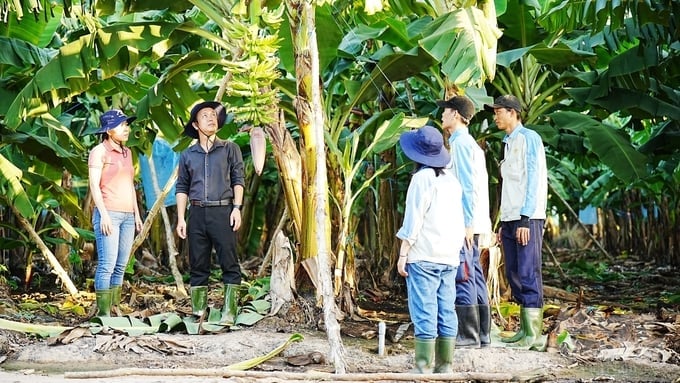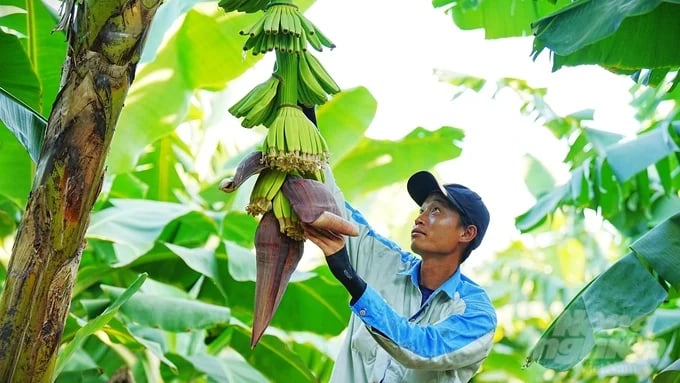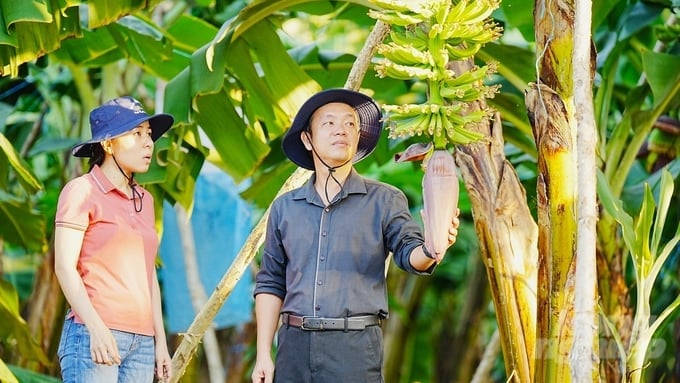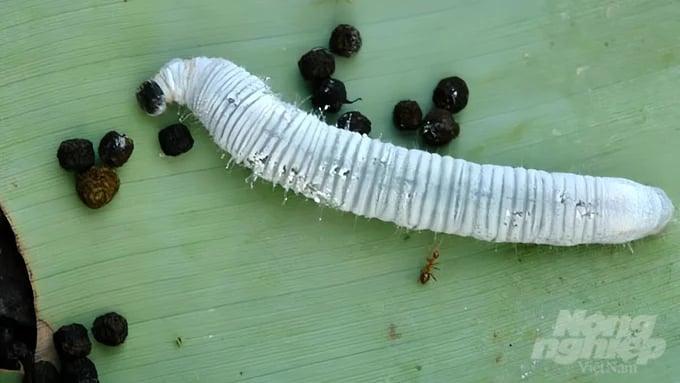June 16, 2025 | 16:09 GMT +7
June 16, 2025 | 16:09 GMT +7
Hotline: 0913.378.918
June 16, 2025 | 16:09 GMT +7
Hotline: 0913.378.918
Unifarm's success results from persistent efforts to adopt and adapt technologies from around the world, particularly those transferred from the Dole Group. Given Vietnam's distinct climate compared to other regions, adapting these technologies has posed challenges related to soil and pest management.
To bring high-quality agricultural products, especially bananas, to consumers, Unifarm's technical team has worked diligently to refine technical processes and tackle pest issues.

Unifarm's experts have tirelessly improved their techniques for cultivating bananas and managing pests and diseases. Photo: Hong Thuy.
Ms. Huynh Thi Tuyet Huong, Deputy General Director of Unifarm and project manager for over 300 hectares of bananas in Dau Tieng District (Tay Ninh Province), shared that since 2014, Unifarm has partnered with Dole, a global agricultural leader with over 100 years of experience. This collaboration has enriched Unifarm's knowledge and techniques for banana cultivation and disease prevention.
However, due to Vietnam’s unique climate and soil conditions, applying techniques from banana-growing regions like the Philippines requires careful adaptation rather than mechanical implementation. Adjustments are necessary to accommodate Vietnam’s specific environmental factors.
Ms. Huong explained, "In our Binh Duong project, we have successfully balanced global banana cultivation techniques with Vietnam's weather conditions. With over a decade of experience, Unifarm has developed high standards in banana cultivation and care."
First, we use pesticides that meet market standards and are permitted in Vietnam. Additionally, we incorporate advanced global technologies such as spraying machines, irrigation systems, and drones. We have also mechanized the land preparation process and utilized tools specifically designed for banana cultivation.
At Unifarm, most of the processes from care to harvest have been automated, particularly the harvesting and transportation stages. Bananas are moved from the garden to the packing house via a pulley system to prevent any scratches.

In integrating technical advances into production, Unifarm focuses on adapting technologies to Vietnam's conditions rather than relying solely on machinery. Photo: Hong Thuy.
Ms. Huong emphasized, "The entire process, from seedlings and planting to care, fertilization, pest control, and biological pesticide use, as well as harvesting, processing, and packaging, follows international standards. Before adopting a new pesticide, we consult experts and assess the market to ensure there are no residual effects."
Unifarm has established a dedicated technical team, including highly skilled engineers, Dole banana experts, and Filipino specialists. This team conducts weekly surveys and inspections of the gardens, monitoring insects, pests, and diseases affecting the bananas. They assess the severity, risks, and damage in the fields to develop comprehensive reports and feasible treatment plans.
According to Ms. Huong, when a new pest emerges in the banana gardens, it is crucial to quickly evaluate the situation and implement appropriate solutions to prevent an outbreak. If pesticides are used, they can affect product quality, so mechanical solutions—such as manual methods—are often preferred.
"For instance, to control pests like leaf rollers, we use light traps to capture insects or remove infected leaves to reduce butterfly populations. By applying these mechanical measures first, we can often reduce insect-related diseases before resorting to chemical treatments," Ms. Huong explained.

Unifarm's technical team remains proactive in surveying and addressing pests and diseases to ensure timely and effective treatment. Photo: Hong Thuy.
There are common diseases affecting banana trees, such as Panama disease and leaf rollers. Prevention methods for these diseases vary by region. Techniques effective in countries like Korea or the Philippines may not work as well in Vietnam. For instance, leaf roller disease, which is not a major concern for banana farmers in the Philippines due to its limited impact, lacks extensive documentation.
“In 2023, our banana farm in Dau Tieng faced an unexpected outbreak of leaf rollers. The infestation developed rapidly and posed a risk of widespread damage. Even experts from Dole and the Philippines were taken aback. Our engineers from all three parties had to collaborate to devise prevention and treatment strategies. The proposed solutions, which involved manual methods rather than chemical pesticides, were ultimately agreed upon. These included using traps to catch butterflies at night and removing the leaf roller pupae from the ground to prevent them from maturing into butterflies,” Ms. Huong explained.

Eradicating banana leaf rollers required manual methods. Photo: Tran Phi.
Ms. Huong also noted that some cultivation practices from Korea or the Philippines are not always applicable in Vietnam. For instance, Panama disease, caused by the fungus Fusarium oxysporum f. sp. cubense, attacks the flowers and leaf stalks of banana trees, compromising their vascular structure. Each region has its own approach to managing this dangerous disease. At Unifarm, the strategy involves eliminating the fungus from the soil.
“If you want to develop sustainably, you must learn from the most advanced methods, but you also need to assess their suitability for your specific conditions. Unifarm’s progress has been achieved by adapting and customizing techniques rather than following a rigid, mechanical approach. It’s about learning and adjusting, not just replicating,” said Mr. Pham Quoc Liem, Chairman of Unifarm.
Despite not growing bananas organically, Unifarm adheres to international standards, which go beyond just organic practices, ensuring successful exports and ongoing cooperation with Dole.
Translated by Quynh Chi
![Turning wind and rain into action: [4] Bringing climate bulletins to remote and isolated areas](https://t.ex-cdn.com/nongnghiepmoitruong.vn/608w/files/linhnhp/2025/06/14/1152-z6704423696987_15fd32ffc26d590d204d520c9dac6786-nongnghiep-151141.jpg)
(VAN) The Vietnam Agriculture and Nature Newspaper interviewed Mr. Vu Thai Truong, Acting Head of Climate Change and Environment at UNDP Vietnam, to gain deeper insight into how climate bulletins are delivered to farmers.

(VAN) In Tien Giang, a high-tech shrimp farm has developed a distinctive energy-saving farming model that has yielded promising results.
![Turning wind and rain into action: [3] 300.000 farmers benefit from agro-climatic bulletins](https://t.ex-cdn.com/nongnghiepmoitruong.vn/608w/files/news/2025/06/12/e5a48259d6a262fc3bb3-nongnghiep-125122.jpg)
(VAN) The agro-climatic bulletin has become a valuable tool for farmers in the Mekong Delta. After more than five years of implementation, the initiative is gradually being expanded nationwide.
![Turning wind and rain into action: [2] Providing forecasts to the people](https://t.ex-cdn.com/nongnghiepmoitruong.vn/608w/files/news/2025/06/12/e5a48259d6a262fc3bb3-nongnghiep-103927.jpg)
(VAN) In addition to improving the quality of hydrometeorological forecasts, putting forecast bulletins into practical use is crucial for production and disaster prevention.

(VAN) Blue carbon is receiving attention for its rapid absorption capacity and vast potential. It represents a promising nature-based solution to respond to climate change.
/2025/06/11/3507-1-161904_583.jpg)
(VAN) Seagrass beds and coral reefs serve as 'cradles' that nurture life in the ocean depths, creating rich aquatic resources in Vietnamese waters.
![Turning wind and rain into action: [1] Forecasting for farmers](https://t.ex-cdn.com/nongnghiepmoitruong.vn/608w/files/news/2025/06/11/e5a48259d6a262fc3bb3-nongnghiep-111919.jpg)
(VAN) Weather is no longer just a matter of fate. Forecasts have now become an essential companion for farmers in every crop season.